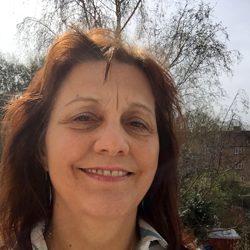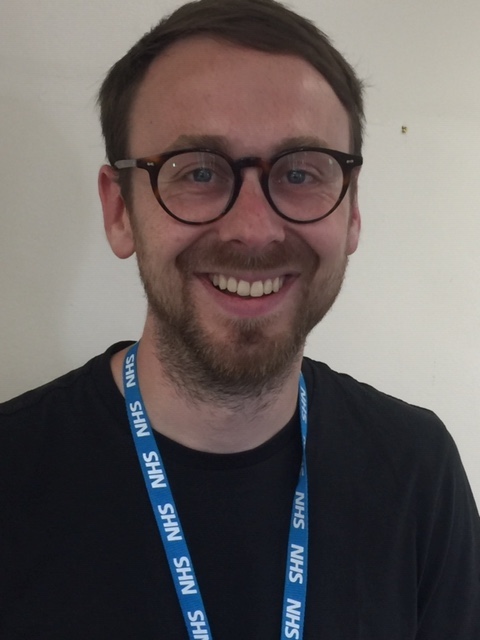Interview by Anna Betz of Ian Sherriffs, manager of the Memory Service at Camden & Foundation Trust, in United Kingdom.
This is Part 5 of 5 parts. Part 1 is here. Part 2 is here. Part 3 is here. Part 4 is here.
What would you describe as success for a team or organization?
Success is difficult to describe. Traditionally, it is associated with rewards handed out by the organisation. To me, success is when your staff member comes into the office smiling and happy to do his/her work. That’s a lot more important and meaningful than receiving awards.
A team can be successful when people are met where they are and are helped to put systems into place that make their work more efficient, enjoyable, and effective. This enables them and the whole team to experience and share in the success.
What was it about the working environment that helped you develop into a collaborative leader?
I was like a sponge that absorbed everything that was helpful, including knowledge, ideas, and feedbacks. I have always felt well supported here. There are issues and there will always be. I never felt I was being judged or was getting into trouble for making mistakes.
I always felt that I was going to be supported through everything, by my seniors. I have a reassuring feeling that if I made a mistake it wouldn’t be a problem. I have been able to push boundaries a little, and have been able to influence how things work.
What did you do differently?
I wanted to push one young promising practitioner to develop her skills, challenge her and think about her role, to help her find her feet. That’s what I enjoy doing. This young practitioner didn’t interview very well, but as a practitioner, she really helps people, shapes their care, and empowers them.
Young members of the team value me and I also value them. It was challenging, shifting from having been their supervisor to being their manager.
How does this award affect you?
It really gave me a little impetus that I have done something right. Now that we will have 3 new staff members soon, I will help them as much as possible. I am wondering how we could incorporate good practices further, like awards or star-of-the-month for team members, or some kind of appreciation ceremony co-created by the team.
What could organizational leaders learn from your experience?
Once you get to the top, you can lose contact with the bottom. That’s something I definitely don’t want to lose, in my career. It is important to promote and support young people’s development. They are the future.
Once the connection between bottom and top is lost, you lose your sense of what is right for the Trust and what is the right thing to do. When status is important, and this is mirrored within teams, that is very unhelpful.
When recruiting I try to go for those who are going to respond. I am looking for a moldable person, someone who is free-thinking. I try to see who the person could become, rather than looking for the typical person by focusing on their academic achievements.
What advice would you give to the Trust when appointing the next manger?
Look and ask what the teams want rather than just looking at what the Trust wants. Teams should be more involved in recruitment of new staff. Occupational Therapists, for example, interview their manager which is a good indication. You get to know who you will be supervised by. Choosing a team manager should be a team decision.
Hiring staff shouldn’t be about their knowledge but more about their approach. For example, nursing staff on the ward are very task-oriented and have often poor people skills. How to avoid that needs to be looked at as a wider approach. The personal qualities someone can bring to a team can be discovered in conversations with new colleagues. Involving the team that has to work with someone can make sure the person is a good fit.
In Camden & Islington Foundation Trust no one is allowed to interview someone at higher banding, meaning higher up in the hierarchy, than themselves. What does that tell you?
Interviewer’s note:
For example, one of the best questions when recruiting a doctor to work with children is “Which is your favorite dinosaur, and why?” The question was designed by a child who used the hospital services a lot. From the doctor’s answer you can assess how they can relate to a child, their creativity, and their sense of humor, which are essential to the job. We often ignore this in more traditional interviews
What’s one significant thing over the coming year?
For myself, I want to find out how to improve my standing in various places to further my future career. For that I need to build and become part of networks.
The team is going through a big change as we have lost experienced staff members. I want to see new staff members make progress, build on the good experiences from last year, and support their development further around the importance of connectivity and mutual support.
I want to develop processes that enable all staff members to come together and learn from each other, which needs to be facilitated. I know it can happen. Learning from each other and learning what concerns team members will improve the whole team. The QI project, which was my idea, has been a good way to get people working together. The next project might or might not be QI, and doesn’t necessarily need to be guided by me.
Interviewer’s note:
QI is often a good place to start, as it is an approved way of involving and empowering staff to directly influence the way they work. Sometimes the way we define it is very narrow. Reducing an infection rate is easily seen as QI but improving staff wellbeing–because of the impact this has on their ability to provide a great service–can also be fitted into this mold, if that is what it takes to make it acceptable to the organisation.
What could each team member do to support the process?
Everyone could reflect and think about their own roles, places, and where they are within a team–not in terms of hierarchy or banding, but what they want to bring to the team and what they are eager to learn and get better at.
Taking responsibility and ownership will result in better achievement than thinking about their banding and who is above or below them. Everyone should bring questions forward and start to collaborate more, share what they are struggling with, and ask for help. People can help each other with organising themselves, managing their workflow, and help each other to deal with challenges.
I am not here to tell people what to do. I encourage them to facilitate conversations amongst themselves. For example, we could use a board on the wall where everyone writes down what they can offer and what they need so that everyone can find out who to turn to for what kind of task. This would naturally encourage more connections and people partnering up by themselves.
Interviewer’s note:
This kind of approach already worked for the strategy team in Torbay. They used a white board, with graphics, to WOL (work out loud) on a new issue each month. They found it produced more creative solutions and also engaged the wider organization which had previously struggled to appreciate the value added by the team.
 Anna’s background is in Health&Social Care, trained in Herbal Medicine, Socialwork, Mindfulness Practice, Transparent Communication, and Systemic Family Therapy. She practices a pro-active evolutionary approach to Health and Wellbeing and leads projects in the UK NHS using Mindfulness and diet for people suffering from diseases like diabetes and dementia. She feels at home in places where individual, communal, organisational, and social evolution meet, and where people support each other in becoming whole, and feel enlivened.
Anna’s background is in Health&Social Care, trained in Herbal Medicine, Socialwork, Mindfulness Practice, Transparent Communication, and Systemic Family Therapy. She practices a pro-active evolutionary approach to Health and Wellbeing and leads projects in the UK NHS using Mindfulness and diet for people suffering from diseases like diabetes and dementia. She feels at home in places where individual, communal, organisational, and social evolution meet, and where people support each other in becoming whole, and feel enlivened. What inspires Ian Sherriffs as Team Manager is the impact that his role can have in developing the knowledge, skill set and confidence of individuals who provide support for people living with dementia and their loved ones. He sees himself as a role model of clinical elements of a job but more importantly an influence on team culture to promote independence, creativity and enjoyment in a sometimes challenging work environment.
What inspires Ian Sherriffs as Team Manager is the impact that his role can have in developing the knowledge, skill set and confidence of individuals who provide support for people living with dementia and their loved ones. He sees himself as a role model of clinical elements of a job but more importantly an influence on team culture to promote independence, creativity and enjoyment in a sometimes challenging work environment.Featured



